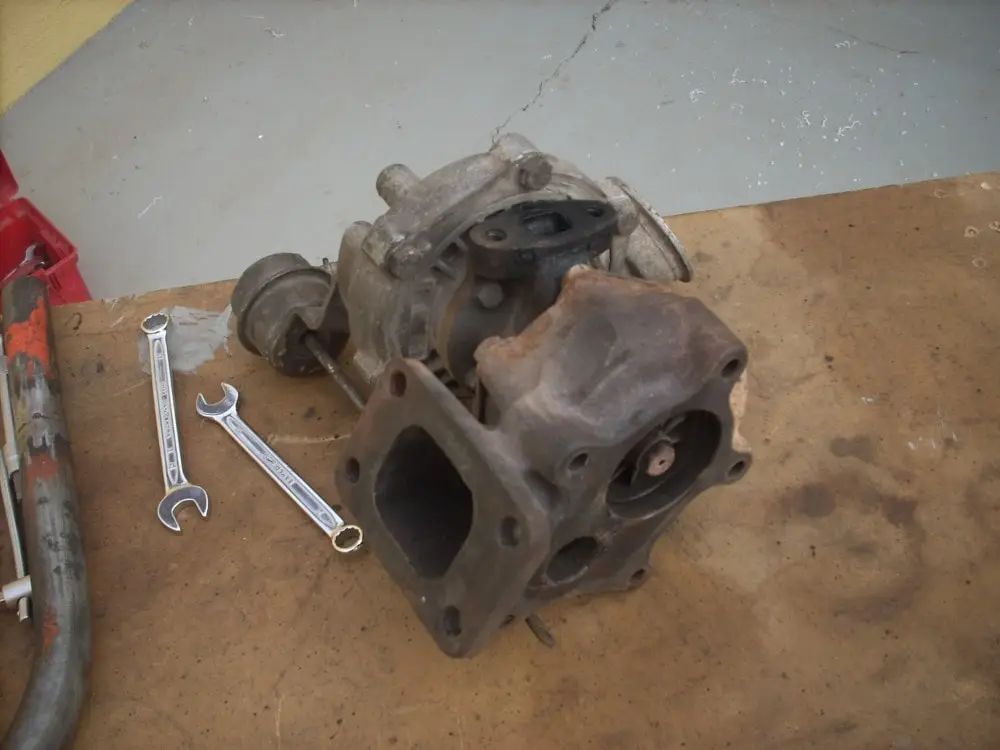If you’ve noticed oil in your intercooler, you’re facing a common but serious issue for turbocharged engines. This guide will help you understand why your turbo is leaking oil, what it means for your engine, and how to fix it.
Understanding Turbochargers and Intercoolers
Before we dive into the problem, let’s quickly review what these components do:
Turbocharger: Think of it as a fan that forces more air into your engine, powered by exhaust gases. It has a turbine wheel on one side and a compressor wheel on the other, connected by a shaft.
Intercooler: This acts like a radiator for the compressed air, cooling it down before it enters the engine. Cooler air is denser, which means more power.
In a properly functioning system, oil should never enter the intercooler. So if you’re seeing oil there, something’s not right.
Why Oil in the Intercooler is Bad News
Oil in your intercooler isn’t just a minor inconvenience – it can lead to some serious problems:
- Reduced cooling efficiency: Oil coats the inside of the intercooler, making it harder to cool the air.
- Engine deposits: Oil can make its way into the engine, causing buildup on valves and in the combustion chamber.
- Increased emissions: Oil burning in the engine leads to more smoke and pollutants.
- Potential engine damage: In severe cases, it can lead to hydro lock or other engine issues.

7 Reasons Your Turbo is Leaking Oil Into the Intercooler
- Failed Turbo Seals and Gaskets As your turbo ages, the seals that keep oil in and exhaust gases out can wear down. When they fail, oil can escape into the air intake side of the turbo.
- Cracked Turbo Housing Extreme heat cycles and physical damage can crack the turbo housing. Even small cracks can let oil seep through under pressure.
- Oil Overfill Too much oil in the engine can force its way past the turbo seals. Always check your oil level carefully – turbocharged engines can be tricky to read correctly.
- Blocked Turbo Oil Return Line If oil can’t drain back to the engine properly, it builds up in the turbo and can force its way past the seals. Regular oil changes help prevent this.
- Excessive Boost Running more boost than your turbo was designed for puts extra stress on the seals. Stock turbos typically run 7-15 PSI, while modified ones might see 20-30 PSI or more.
- Overheating Issues Extreme heat can damage seals and gaskets, and cause oil to break down faster. Always address overheating problems promptly.
- Worn Turbo Bearings As the bearings wear, they allow more shaft movement. This extra play can cause the shaft to contact and damage the seals.
Diagnosing a Turbo Oil Leak
Look for these signs:
- Blue smoke from the exhaust
- Loss of power or boost pressure
- Unusual noise during acceleration
- Oil around the turbo or in the intake pipes
How to Fix a Turbo Leaking Oil
- Identify the root cause: Don’t just clean the intercooler and call it a day. Find out why the oil is leaking.
- Replace faulty components: Depending on the cause, you might need new seals, gaskets, or even a complete turbo replacement.
- Clean the intercooler: Remove it from the car, flush it with solvent, and rinse thoroughly.
- Address any underlying issues: Fix problems like overheating or excessive boost that might have caused the leak.
- Consider upgrading: If you’re pushing your stock turbo too hard, it might be time for an upgrade.
Preventative Maintenance
To avoid turbo oil leaks:
- Change your oil regularly with the correct grade
- Let your turbo cool down before shutting off the engine
- Address boost leaks and overheating issues promptly
- Don’t push your turbo beyond its design limits
Turbo Replacement: New vs. Remanufactured
If you need a new turbo, you have options:
New turbos offer peace of mind but can be expensive.
Remanufactured turbos are more affordable and often come with warranties. Just ensure you’re getting one from a reputable source.
Key Takeaways
- Oil in your intercooler is a serious issue that needs prompt attention
- Multiple factors can cause turbo oil leaks, from worn seals to engine issues
- Regular maintenance is crucial for preventing turbo problems
- Always address the root cause, not just the symptoms
By understanding why turbos leak oil and how to address the problem, you can keep your turbocharged engine running smoothly for years to come. Remember, when in doubt, consult a professional mechanic familiar with turbocharged engines.

